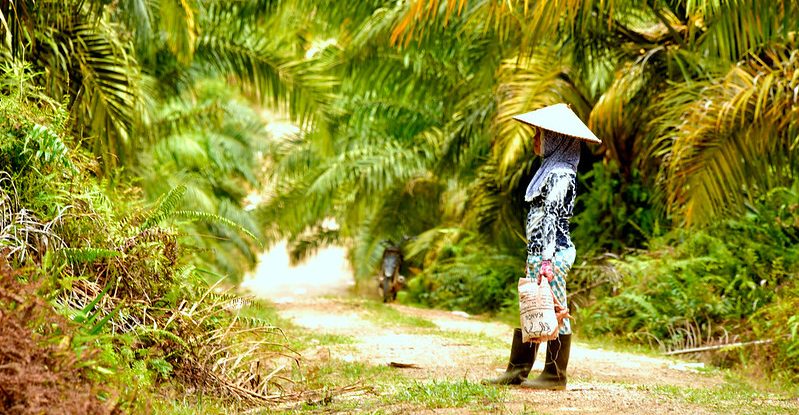
Trade in agricultural commodities has been linked with deforestation in tropical regions across the globe. But what’s driving the biggest losses, and what can we do about it?
The Trade, Development and the Environment Hub (TRADE Hub) project works to tease out this complex picture, and guide effective action to make trade in agriculture and wildlife more sustainable through research on supply chains, social and environmental impacts; future scenario modelling; and recommendations for the public and private sectors. Its research activities are conducted by 50 organisations based in 15 countries, and it has research sites in nine countries, including Indonesia, where it focuses on the palm oil, coffee, and wildlife trades.
The hub’s research has found that international demand for agricultural commodities is driving 35% of deforestation, “and that’s a very interesting data because it means that the rest is domestic demands, though this varies enormously in terms of the commodity, the country, and the locality,” said Fabiana Spinelli, TRADE Hub Synthesis and Data Officer at the UN Environment Programme World Conservation Monitoring Centre (UNEP WCMC).
She made the remarks during a TRADE Hub-led regional stakeholders’ consultation on nature-positive trade for sustainable agriculture supply chains and inclusive development in Asia, which was held in Jakarta, Indonesia, from 26-27 September 2023.
As part of the consultation, the TRADE Hub presented a global roadmap to just and sustainable trade in agricultural commodities and wildlife, and a national roadmap to a just and sustainable palm oil trade. The two-day event brought together diverse stakeholders, including representatives from governments, the private sector, policymakers, civil society, research, and financial institutions.
Participants explored and offered recommendations for actionable solutions, promoting a shift towards sustainable and inclusive nature-positive trade that aids countries in achieving several objectives. These include establishing sustainable supply chains for agricultural commodities, ensuring market access for all stakeholders in line with regional trade agreements and global environmental accords, and preparing for evolving market regulations such as the EU deforestation-free products regulation (EUDR).
Power and responsibility
Lisen Runsten, senior programme officer for nature and trade at UNEP-WCMC, said the process of developing the new roadmap involved meticulously examining the challenges plaguing the current trade system, identifying the key stakeholders, and mapping out the power dynamics and responsibilities within the system.
“Through the roadmap, we’re taking a high-level overview of the issues that are troubling the trade system today, and working out who has what power, and who has what responsibility, to confront those issues,” she said.
Herry Purnomo, a senior scientist at the Centre for International Forestry Research and World Agroforestry (CIFOR-ICRAF) who coordinates the TRADE Hub in Indonesia, acknowledged that the power balance in agricultural and forestry products is often uneven.
Typically, he said, those closer to the market wield more influence, while those involved in commodity production face greater challenges in asserting their interests. In the case of palm oil, he said that people who own the refineries hold more sway than plantation owners, shedding light on the complex interplay of power, economics, and trade within the industry.
Fairness and collaboration
Edi Suhardi, a sustainability affairs representative for the Indonesian Palm Oil Business Association (GAPKI), said that trade must inherently be intertwined with the principles of fairness and ethics. He drew attention to the notable disparity between sustainable palm oil production and its market access: while Indonesia produces 8.6 million tons of Roundtable on Sustainable Palm Oil (RSPO)-certified palm oil annually, some of this goes unpurchased, and only 5 percent of Indonesian palm oil products made their way to the EU market last year. He expressed hope that the research findings would help to bridge this gap and align the intentions and efforts of producers with market demand, ultimately contributing to a more sustainable and ethical trade landscape for palm oil.
Mansuetus Darto, the secretary-general of the Oil Palm Farmers Union, said that smallholders play a crucial role in implementing sustainable practices and improving the business model within the industry. However, he also said that this objective cannot be realized at the district level without the support of both companies and government entities.
He underscored the fragmented nature of smallholders at the district level and the need to support them to organize into cooperatives to effectively achieve sustainability goals. He also emphasized the necessity of government support to establish partnerships between smallholder cooperatives and companies, promoting fairness and collaboration.
Acknowledgements
The Trade, Development and the Environment Hub is led by the UN Environment Programme World Conservation Monitoring Centre (UNEP-WCMC) and funded by the UK Research and Innovation Global Challenges Research Fund (UKRI-GCRF). In an effort to promote nature-positive trade for sustainable agriculture supply chains and inclusive development in Asia, UNEP joined forces with the United Nations Conference on Trade and Development BioTrade Initiative (UNCTAD BioTrade), the Center for International Forestry Research and World Agroforestry (CIFOR-ICRAF), as well as IPB University and the Center for Climate and Sustainable Finance University of Indonesia (CCSF UI), to facilitate the Regional Stakeholders’ Consultation and develop the Roadmap.
We want you to share Forests News content, which is licensed under Creative Commons Attribution-NonCommercial-ShareAlike 4.0 International (CC BY-NC-SA 4.0). This means you are free to redistribute our material for non-commercial purposes. All we ask is that you give Forests News appropriate credit and link to the original Forests News content, indicate if changes were made, and distribute your contributions under the same Creative Commons license. You must notify Forests News if you repost, reprint or reuse our materials by contacting forestsnews@cifor-icraf.org.